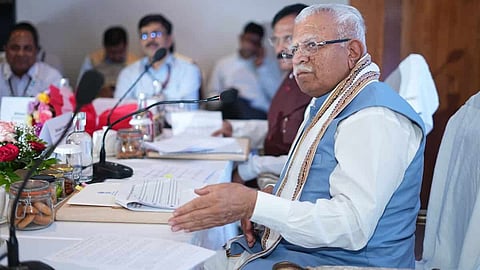

New Delhi: The share of renewable energy (RE) in India's total installed power generation capacity has reached nearly 50 percent, and the country is expected to meet its target of achieving half of its capacity from non-fossil fuel sources by the end of this year, Union Power Minister Manohar Lal Khattar said on Wednesday.
India has committed to achieving 50 percent of its total power generation capacity from non-fossil fuel sources by 2030 under its updated climate goals.
“We have reached almost 50 per cent (share of renewable capacity) of the 472 GW total generation capacity, and by the end of the year, we will achieve it also,” Khattar said while speaking at an event organised by the industry body India Energy Storage Alliance (IESA).
According to official data, India’s total installed power generation capacity stood at 475.590 GW as of May 31. Of this, 235.53 GW was from non-fossil fuel sources, including solar, wind and nuclear energy.
The power minister emphasised that solar and wind capacities will be crucial in meeting the country's rising power demand. “The government is aware that solar and wind capacities will be needed to meet the country's growing power demand and several achievements have been made in this area,” he said.
He also underlined the importance of storage solutions in the energy transition. “Energy storage systems will be needed to stabilise the grid, optimise power generation and ensure round-the-clock supply of clean energy,” Lal added.
The event, hosted by IESA, has drawn around 1,000 participants from over 20 countries. Senior government officials and key industry stakeholders are also attending the four-day gathering, which began on Tuesday, the alliance said in a statement.
As part of its updated Nationally Determined Contributions (NDCs) submitted to the United Nations Framework Convention on Climate Change (UNFCCC) in August 2022, India has pledged to reduce its emissions intensity by 45 per cent by 2030 compared to 2005 levels, and to achieve 50 per cent of cumulative electric power capacity from non-fossil fuel sources by 2030.
